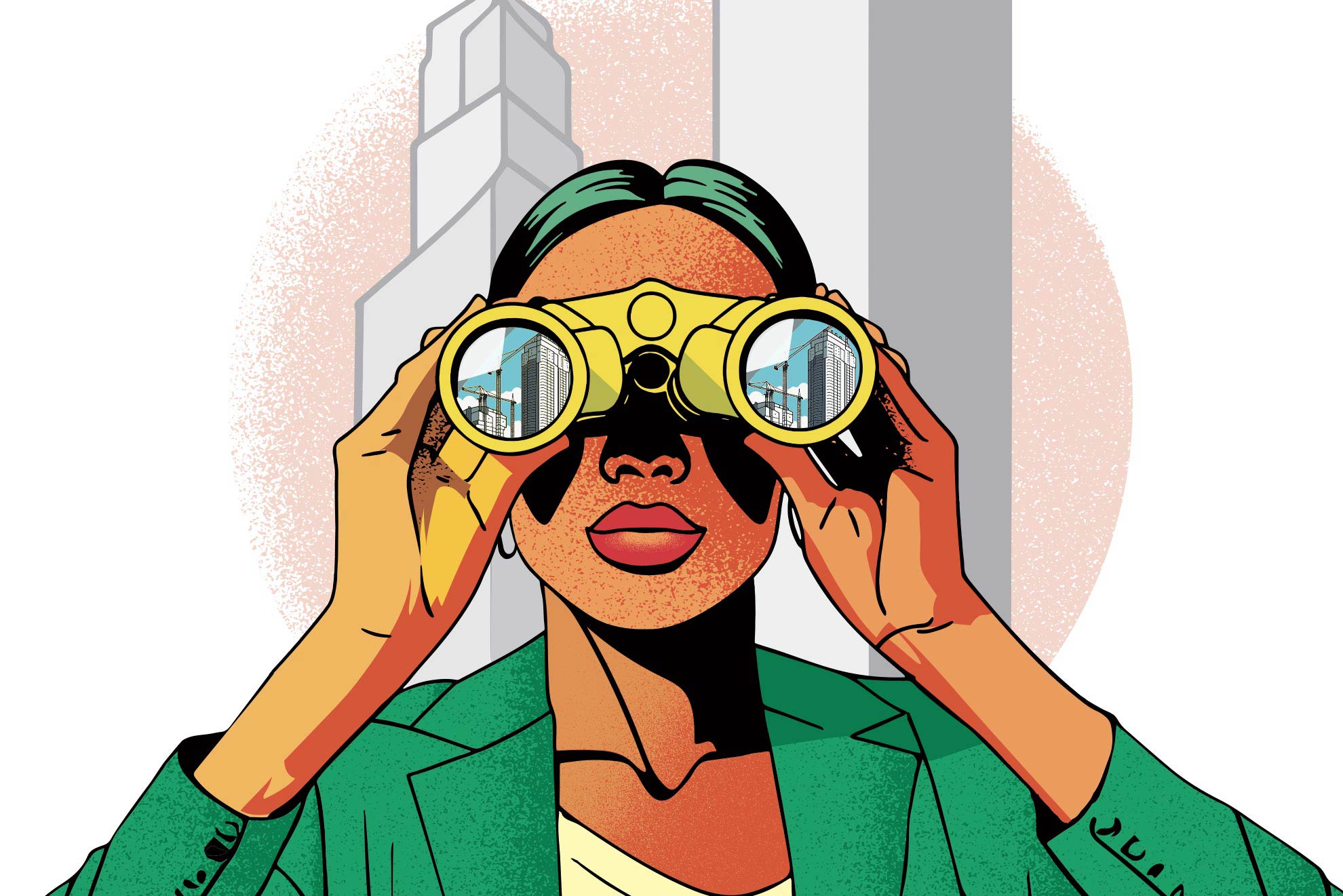
In the second installment of our special feature focused on “Women in Hospitality,” we ask the question: Is there still an old boys club—especially in hotel development?
HOTELS: The traditional roles for women in hospitality have been in areas such as marketing or HR or design, to name but three. Other segments, such as development, carry “old boys club” mentalities. How can recruiters and boards be more inclusive and cognizant across disciplines outside the perceived traditional positions?
Lisa Lombardo, president, ARK Holdings Group: I think it’s happening. We are interviewing for a construction project manager and the two top candidates are women—and I am only involved in the process when we think they could be a “yes” to fit with our culture. Up until that almost final point, as a woman who is president of our parent company, I have had little influence. The reality for women is that we haven’t had time to build the same resumes; we haven’t logged the same experience in all spaces of the industry. That’s changing and the merit of candidates is becoming more equitable. It’s no different than looking back at how difficult it was for women entrepreneurs to get business loans just a few decades ago. Why? Because until 1988 and the passage of the Women’s Business Ownership Act, women could only get business loans if a male relative cosigned the loan. Women are a mere 36 years into having the ability to get a business loan on our own. It’s the stories of women going from closed doors to closing deals over the decades that have motivated many of us along the way.
Agnès Roquefort, chief development officer, Accor: I can personally attest that forward thinking companies are making a profound difference in the industry, not just by adopting policies or leading the conversation around gender parity, but by actually appointing women to key leadership roles, such as myself. Consider development: Among the developers and hotel owners that we work with, the most important factor for them is establishing long-term relationships that are rooted in trust, transparency and cooperation. When Accor puts a woman at the helm of that action, it sends a very powerful message about our commitment to gender equity. Fortunately, our partners share our values and at least 60% of our new projects come from those existing partners, so they very clearly trust that when Accor puts a person in a leadership role, that person is uniquely qualified to drive that business.
Allison Reid, former chief global growth officer, Aimbridge: You can’t worry about what you can’t control. Does the old boy network still exist? Yes, but there has been enough change that it’s not career limiting. What I love is the rise of the “smart girls club,” because women are helping other women succeed more than ever. There’s also an undeniable positive financial impact of a diversified leadership team, and CEO, boards and C-suite executives understand that. Be the woman that helps other women succeed, not the one who complains about the lack of opportunities.
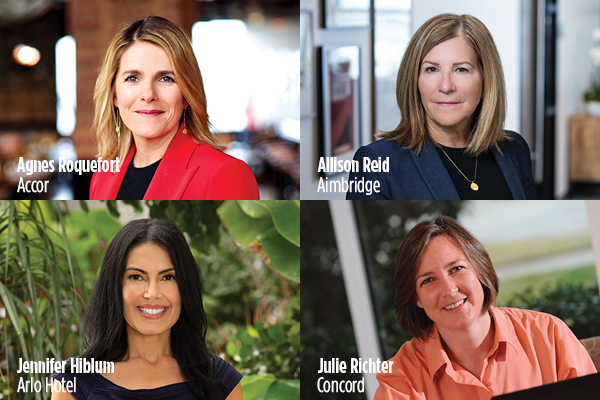
Arlie Sisson, SVP, global head of digital, Hyatt Hotels Corp.: This really requires a deeper look at our industry’s approach to recruiting and the criteria by which we evaluate candidates. Arlie Sisson Certain roles seem to gravitate toward similar groups of people: How can that process be disrupted and improved? It comes down to three things: 1) being intentional about DE&I; 2) removing barriers to entry to our industry; 3) providing training and support to expose candidates to other aspects of hospitality and lodging.
Janine Williams, founder & CEO, Impulsify: I recently sat with the CEO of a huge hotel technology company. I asked him why there were no women in leadership positions there. His immediate response: “We just hired a CMO who is a woman!” as though this was a concession to the fact no women were actually in a leadership position that drives product or technology strategy at a technology company. He saw me roll my eyes, then said, “I know, I know. I just tend to hire people I have known and spent time with over my career and they happen to be mostly men.” It made sense to me honestly. It wasn’t deliberate exclusion of a gender; he just had more experience dealing with men over a 30-plus-year tech career.
Jennifer Rausch, chief people officer, Sonesta: I’m excited to see women making inroads in several less traditional departments within Sonesta: security (12% of the workforce), culinary (24%) and engineering (4%). Our development team is 20% female. Though it’s still about hiring the best candidate, there is much more consistent attention to diversity in the candidate pool being considered. That’s really the key to a diverse workforce, which then benefits the organization with diversity of thought and experience.
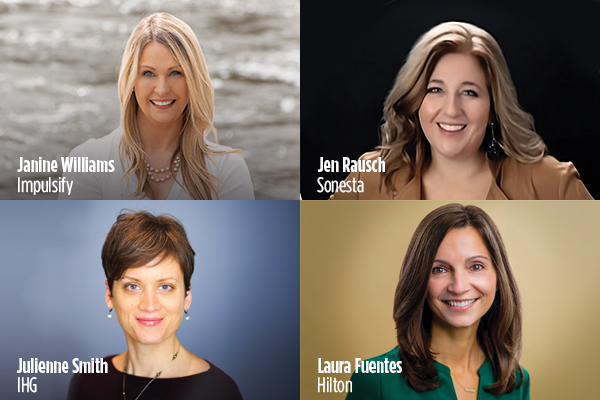
Jennifer Hiblum, GM, Arlo Wynwood: We need to shake things up and break down those “old boys club” mentalities that might still linger in certain segments. One way to do this is by rolling out diversity and inclusion initiatives that put fair hiring practices front and center. I believe something should be set in stone to make sure every candidate, no matter their gender, has an equal shot at opportunities within the industry. Recruiters should continue to expand their networks and actively seek out qualified female candidates for positions in development, finance, operations and other non-traditional roles. Boards should prioritize diversity and inclusion by setting targets, providing unconscious bias training and seeking diverse perspectives. Overall, creating an inclusive environment in hospitality demands efforts from recruiters, boards and leaders to dismantle barriers and ensure equal opportunities for women in leadership positions.
Julie Richter, CFO, Concord Hospitality: Addressing the “old boys club” to me is not a recruiter or board member issue. It is the responsibility of company leaders to make sure that the women in their underwriting teams, accounting and finance teams and design teams are invited to the table if that is where their interest lies. At conferences, they should be introduced and allowed to play a role in the meetings. Simply paying the fee for attendance doesn’t foster growth of relationships, especially when there is a long-standing connection between groups. It’s good old-fashioned mentorship in my mind.
Julienne Smith, chief development officer, Americas, IHG: I don’t believe it’s an intentional omission for women in development. People naturally tend to hire those who make us comfortable and often those are others we know or who look like us. The same applies for striving for role: people often tend to go for positions held by people who look like them. To change that, diversification must become more intentional.
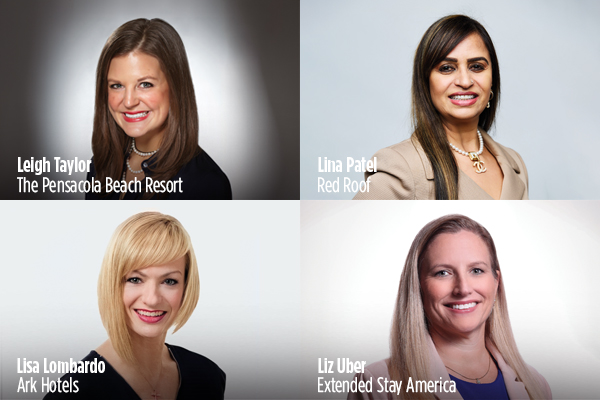
Leigh Taylor, co-founder & president, The Pensacola Beach Resort: When I first entered real estate, I was a senior in college interning on Wall Street in a real estate and hospitality investment banking group of a major bank. There were virtually no senior women. It was even tougher back then than it is now. If you’re a recruiter or hiring manager, don’t underestimate female applicants’ grit and determination to be successful within an old boys’ club or doubt their areas of interest, whether they are a 20-year old starting as an analyst or a seasoned 55-year-old joining the Board of a publicly traded company. It’s easy to assume that someone won’t pass the team’s “fit” test. Those nuanced and passive decisions probably happen more often than proactive gender bias in hiring decisions. In my experience, doing a killer job and not trying too hard to “be one of the boys” was the recipe for success and great relationships.
Lina Patel, director of strategic franchise initiatives, Red Roof: Resolving this issue requires collaboration. We, as an industry, are used to working as a team to be effective, but those in hiring positions must form diverse panels to avoid favoring biases or creating unfair judgements for hospitality to become more inclusive. Red Roof supports this cause, such as the SHE Leads conference, where women business owners learn about mentorship programs and opportunities for growth. The more we share stories of successful women thriving in our industry, the more powerful women we will attract to this space.
Liz Uber, COO, Extended Stay America: Several things can be done to further support the hiring and development of women in all areas of the hospitality industry. This includes rotational training in high school and college hospitality programs that encourage less traditional roles as part of their coursework. There is tremendous value in experiencing a range of on property operational roles and learning about the financial elements of operating, owning, buying or selling a hotel before ascending to a leadership position.
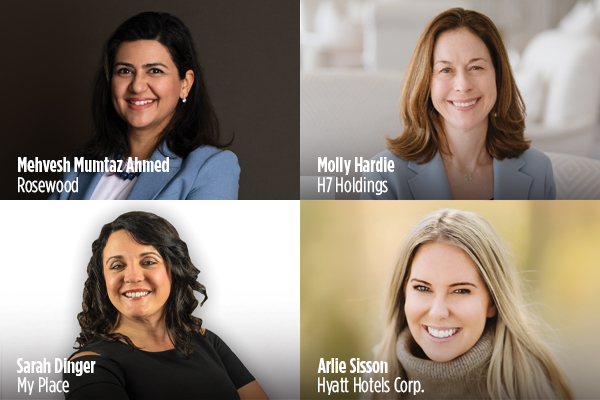
Mehvesh Mumtaz Ahmed, VP of social impact, Rosewood Hotel Group: Unfortunately, there is unconscious bias when it comes to recruiting that is just now coming to the surface. It has perpetuated our reality of certain roles or departments being occupied by majority men or women and others being more gender inclusive. The best way to diversify traditionally male-dominated areas is to enable and empower female co-workers to grow. When women start to break the glass ceiling, they tend to bring other women along with them. At Rosewood, we are lucky to be led by a female CEO, who has surrounded herself with equally powerful women.
Sarah Dinger, EVP of brand management, My Place Hotels: This is an area where women can make significant strides by challenging stereotypes and pursuing opportunities to be considered for these positions. You can’t expect to be considered if your interest is not made known. In my view, the skills necessary for success in development are not gender specific. By positioning ourselves to understand the business thoroughly, leveraging available resources and actively pursuing growth opportunities, we can confidently pursue and will excel in these positions. You’ve got to be confident and go for it!
Sima Patel, co-founder & CEO, Ridgemont Hospitality: Recruiters and boards can begin their search for candidates for higher positions by disregarding preconceived notions about who should be included in the candidate pool. They should seek individuals, regardless of gender, who excel in their current roles, demonstrate motivation and have proven their ability to learn and adapt to challenges.
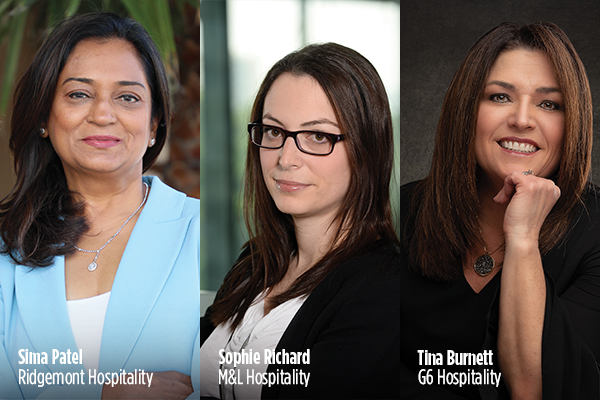
Sophie Richard, asset manager, M&L Hospitality, current president, HAMA Europe: It is time for companies to recognize that gender and age are irrelevant to skills and dedication. I believe that balanced gendered organizations will always have a cutting edge as each person will bring different sensibilities, which greatly strengthens the overall group. Brainstorming sessions in a diverse group bring incredible results. If higher level recruitment and organizations could see and experience this, there would be no going back.
Tina Burnett, chief development officer, G6 Hospitality: An inclusive workforce is critical and boards must recognize and understand the importance of having different perspectives represented at the table. It’s also important to pause and question: Why aren’t women as prevalent in areas like operations as they are in marketing? What steps can be taken to change that? Women are natural innovators who make fantastic leaders and can grow a flourishing business from the ground up. And, while being “emotional” has historically been coined a weakness in leadership, many overlook the emotional strength it takes in fostering much deeper connections with our franchisees and counterparts, allowing us to get to know them better at a personal level and understand how they conduct business.
